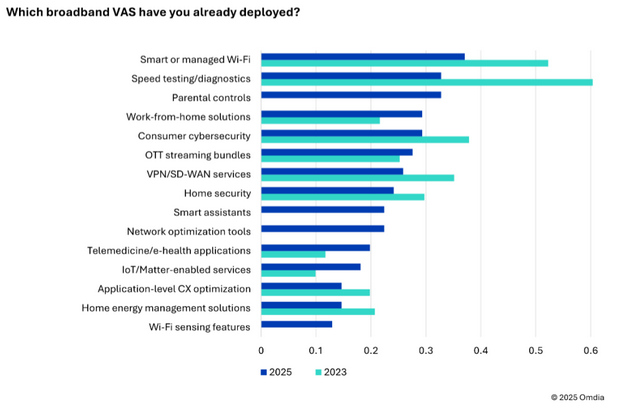Report: USP critical to broadband service provider AI plans
October 9, 2025

Broadband Service Providers (BSPs) are overwhelmingly planning to move to Broadband Forum’s User Services Platform (USP/TR-369) standard in order to introduce AI, Wi-Fi sensing, L4S, and more into their home broadband offerings. This is part of their ongoing drive to deliver differentiated services and boost customer revenue, a report has revealed.
The Future of the Connected Home report from the Broadband Forum in conjunction with Omdia and sponsored by Aprecomm, Calix, Friendly Technologies, Incognito, Motive and Nokia presents findings from a global service provider survey of 116 companies across 32 countries.
Work-from-home solutions has emerged as the fastest growing broadband value added service (VAS) since the previous 2023 report, with nearly 30 per cent of BSPs already deploying it. Other widely adopted services include smart or managed Wi-Fi, speed testing/diagnostics, and consumer cybersecurity. Newly surveyed VAS, parental controls, has also been widely deployed by BSPs.

However, the report identified a cautious approach from BSPs for VAS investment, due to growing uncertainty of how to successfully monetize them. Low customer demand was identified as the biggest challenge for introducing new VAS, but BSPs need to continue to engage and communicate with the customer, so that they understand the value they bring.
“The latest report is enlightening and builds on our previous connected home survey for a global perspective of today’s smart home,” said Broadband Forum Connected User Work Area Co-Director and QA Cafe Director of Technical Marketing Jason Walls. “It’s incredible that 88 per cent of operators have or are planning to deploy USP/TR-369, solidifying the industry’s evolution from TR-069. Finding ways to monetise value-add services enabled by USP will only get easier.”
An overwhelming majority of respondents (97 per cent) deemed AI-powered features important for enhancing the connected home experience. AI is already being used for analysing customer usage patterns, and 42 per cent of respondents advise that they use the technology for network traffic optimisation and a third are considering it for improved energy consumption. A number of Broadband Forum initiatives provide the customer and network performance data which are key datasets for AI-driven decision making.
“The latest report details how BSPs can make more success out of broadband value added services with new technologies, strategies, and standards,” added Omdia Senior Research Director Michael Philpott. “As home broadband subscriptions saturate, value added services will be key to broadband revenue growth.”
Investing in the core broadband technology enables a more rounded VAS strategy. This integrated approach not only creates greater operational efficiencies but is enabling service providers to be more innovative by opening up new VAS opportunities.
Open standards were deemed key for more varied VAS offerings, and there remains strong support for Broadband Forum’s USP standard with real-time data collection identified as a key use case. Approximately 88 per cent of service providers are either deploying USP or will do within the next 18 months. BSPs are more confident in the support for standardised solutions, with concerns about lack of support dropping from 25 per cent (in the 2023 report) to less than 15 per cent of respondents.
The report also highlights the importance of software containerization as part of service providers’ VAS plans to deliver new applications into the home via the CPE. There is a strong demand for the technology, with it being the preferred way of deploying new services for applications such as QoE monitoring and VPN/SD WAN.
